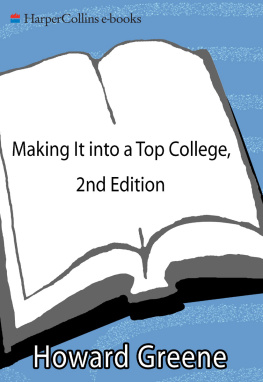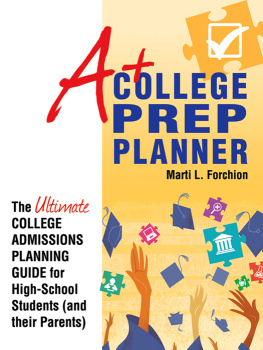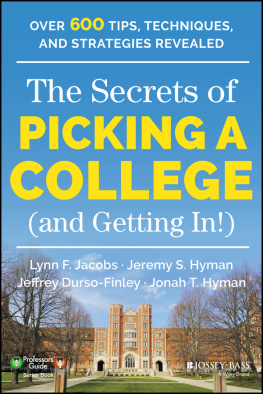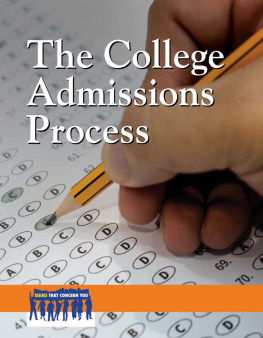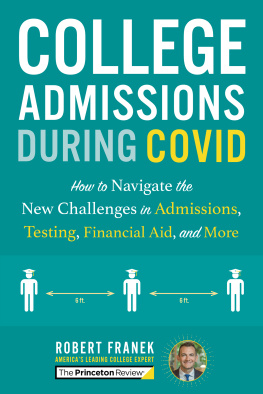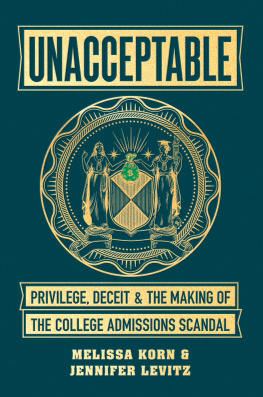This is a work of nonfiction. The events and experiences I detail here are all true and have been faithfully rendered as I remember them, to the best of my ability. Though conversations come from my keen recollection, I did not write them to represent word-for-word documentation; rather, I have retold them in a way that evokes the real feeling and meaning of what was said. Three phone conversations between Rick Singer and me in October 2018 were taken from partial transcripts created by the FBI and presented in court documents. Statements made in open court were taken from transcripts of the proceedings. In addition, the names of two students in the book, Bodhi Patel and Mia DAngelo, have been changed to protect the privacy of these two individuals. Finally, Stanford athletics director Bernard Muir has publicly denied that he personally knows Rick Singer.
To Molly, Nicholas, and Nora
Contents
FEBRUARY 2019
Y ou probably dont think you need to hear this. I wouldnt have guessed I did. But heres the thing: when special agents from the Internal Revenue Service and Federal Bureau of Investigation knock on your door at 7 a.m. and flash their badges and ask whether they can come in, your answer should be no. Tell them youre happy to reschedule when you have a lawyer by your side.
Maybe that knock will come, as it did for me, after you have just finished changing your daughters diaper, and the remnants of your kids breakfastsyogurt and smashed berriesare all over your Red Sox T-shirt and pajama pants. Maybe you and your wife will be in the middle of snapping onesies and tying shoes and packing backpacks so you can get to daycare drop-off before you both rush off to work. Youre going to be puzzled by the agents appearance on your front step and probably a little nervousI know I wasand your instinct will be to say, Sure, of course, come in.
You may even offer them coffee and help with their chairs as they settle in at your kitchen table. Then youll join them and fold your hands in front of you and look at them openly, ready to help. Youll think you are doing the right thingafter all, you have nothing to hidebut you will be making a colossal mistake.
Only innocent people let them in, my lawyer would tell me later. Criminals know not to do that.
But there they were, sitting across from each other: two federal agents, both female, both around thirty years old, both in gray pantsuitsall business. The IRS agent, who had introduced herself as Elizabeth Keating, had placed a blank yellow legal pad and a pen in front of her. The other woman, from the FBI, whose name I did not catch, had pulled a stapled packet of papers out of a portfolio. From where I was sitting at the end of the oval table, I could make out a few words on the top page. I saw my name. I saw Stanford University.
So, we just want to confirm a few things with you, the FBI agent said. You are John Vandemoer.
I heard Boston in her pronunciation. Vanda-moah.
You are the head sailing coach at Stanford.
Yes, I said.
Beautiful school. Must be nice living here right on campus?
It is. Yes. Its great.
My wife, Molly, and I had moved to this development of spacious, two-story houses built by Stanford for its coaching staff seven years before. Wed brought each of our two children home from Stanfords Childrens Hospital after theyd been born, and now they were enrolled in a terrific on-campus daycare center a few blocks from our house. Our fellow coaches were our neighbors and friends. We went to each others competitions, cheered each others successes, and celebrated holidays and birthdays together. Molly and I loved the community and life wed built here.
Now, part of your job, Mr. Vandemoer is recruiting athletes for the sailing team. Is that correct?
Thats right.
Would you walk us through that a little? How recruiting works at Stanford?
I started in on the basicsthat academics were the primary consideration, that there were no scholarships in college sailing, and that my sport wasnt part of the National Collegiate Athletic Association (NCAA), so I wasnt under those constraints. I told them that Stanford admissions allotted me six or seven slots for recruited sailors each year, provided those students met the schools stringent academic standards. Agent Keating took notes while I spoke.
The FBI agent asked me about application timelines and test scores and GPAs, often referring to the paper in front of her as if she were reading from a script. They were the kinds of questions Id answered happily hundreds of times at college nights and high school regattas during my eleven years at Stanford and before that, as head coach at the US Naval Academy in Maryland. Recruiting was one of my favorite parts of the job. I knew a lot of coaches who dreaded it, but I liked interacting with young athletes, learning what their strengths were, and figuring out where they might fit on the team. What I didnt enjoy was having to tell kids no. But I prided myself on being honest if I didnt see a spot for them. I never wanted to give anyone false hope.
And when you find a student you want, what do you? she asked, turning to the next page in her packet.
I take their academic information to the admissions office. Theyre only looking at grades and test scores at that point, just the feasibility of them getting in.
And this happens when?
July and August, mostly. I do it then because the Ivies cant offer kids anything until September 1st. I try to, you know, beat them to the punch.
Makes sense, she said, giving me a fleeting smile.
I smiled back. Agent Keating didnt look up.
And if they have the appropriate grades and scores, what happens then?
Then admissions might give me a pink envelope to send to them, I said.
Pink envelope?
Pink envelopes are what Stanford calls early application packets that are just for recruited athletes.
I told them that Stanford usually offered me about a dozen pink envelopes for potential recruits. Receiving that application didnt guarantee the school would accept the kids, and it wasnt a promise that Id ultimately use one of my admissions slots on them. It just meant they were over the first hurdle in the recruiting process. Sometimes, the high school students who received the pink envelopes decided not to apply to Stanford. But if they did fill out the application, those bright pink envelopes went into a special pile and got an early read from admissions officers.
And this gives them a leg up on regular applicants?
To a certain extent, yes, because theyve already been vetted. Admissions wouldnt offer a pink envelope to them unless they had a very good shot at getting in.
And do you know how many of your recruits get in?
My acceptance rate is about 80 percent, I said.
And the usual Stanford acceptance rate?
Its less than 5 percent.
She looked up at me, tilted her head, and narrowed her eyes. Okay. So, your support does help a great deal.
I detected a hint of disapproval in her voice. I shifted in my seat. Upstairs, I could hear Nicholas repeatedly asking Molly who Daddy was talking to. Nora had started to cry. I felt terrible that Molly had to deal with the kids by herself. I glanced at my watch. It was almost 8 a.m. We both had to get to work.
Can you tell me what this is about? I asked.
I knew a big NCAA basketball scandal had blown up recently; recruiting rules had been violated, coaches had been fired, shoe company executives had been caught bribing athletes. It had been all over the national news. I thought they might be gathering background information for that case, getting the lay of the recruiting land, something like that.
Just a few more questions, Agent Keating said, glancing up at me.



